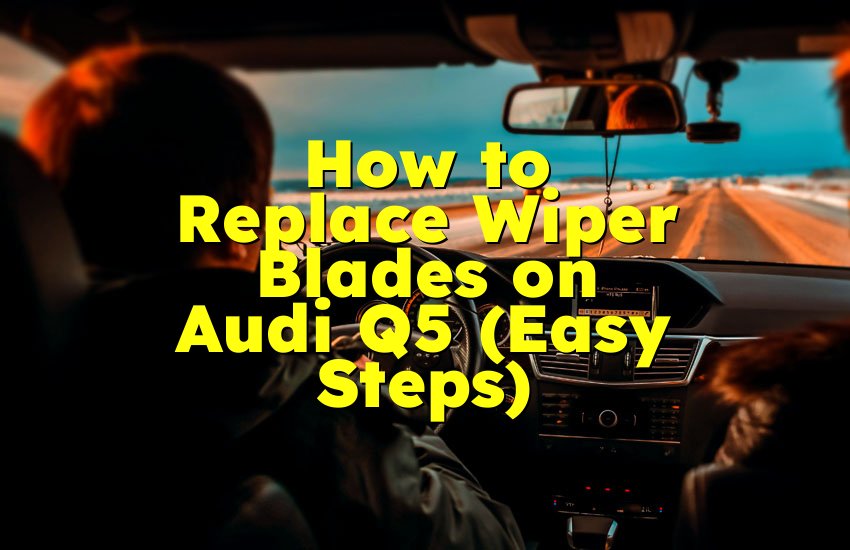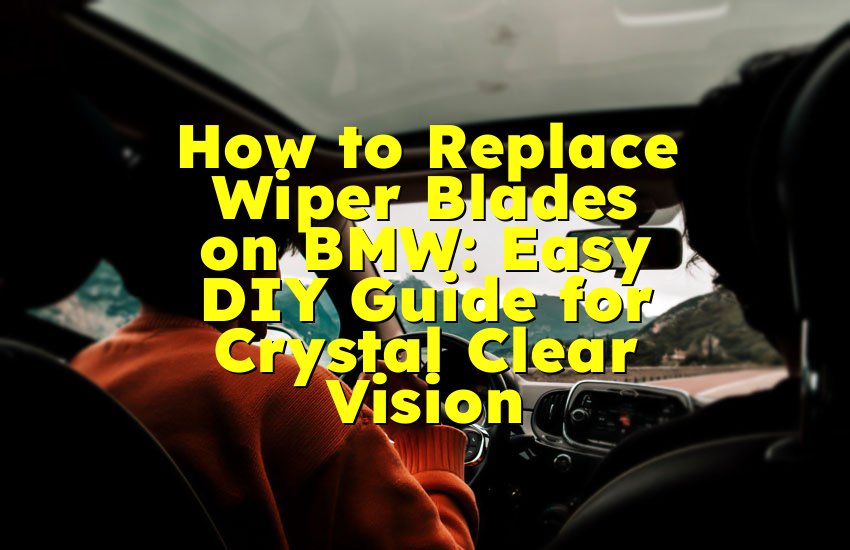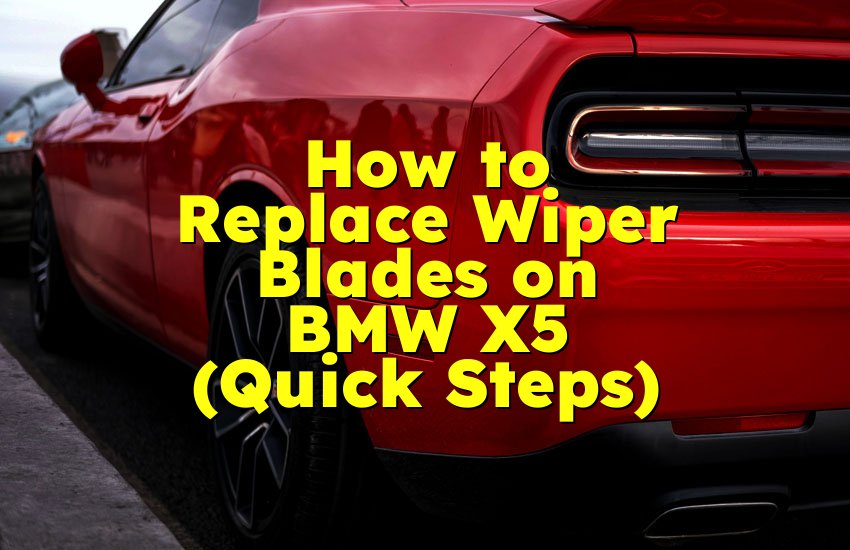As an Amazon Associate, I earn from qualifying purchases at no extra cost to you.
Clunking Noise From Rear Of Car
If you are hearing a clunking noise from the rear of your car, it could be a sign of worn-out suspension components or loose bolts. It’s important to address this issue promptly to prevent further damage and ensure your safety on the road.
A clunking noise is often a warning sign of a potential problem with your car’s suspension or drivetrain, and it should not be ignored. Ignoring this issue could lead to more extensive and costly repairs down the line. To identify the cause of the noise, it’s best to have a professional mechanic inspect your vehicle.
They can accurately diagnose the problem and recommend the necessary repairs to get your car back in proper working condition. By addressing the clunking noise promptly, you can avoid potential safety hazards and costly repairs in the future.
Common Causes Of Clunking Noise
The clunking noise from the rear of your car may be caused by worn suspension components or loose exhaust parts. It is essential to have a professional inspection to diagnose and address the issue promptly for safe driving. Regular maintenance can prevent further damage and ensure a smooth ride.
Damaged Suspension Components
When suspension parts are damaged, they can lead to a clunking noise from the rear of your car. Common damaged components include shock absorbers, struts, or control arms.
Worn-out Bushings
Old or worn-out bushings in the suspension system can result in a clunking noise. Bushings help absorb shocks, so when they degrade, noise may occur.
Loose Or Worn-out Exhaust Components
Exhaust components, such as mufflers or pipes, can become loose or worn out, creating a clunking noise. It’s vital to check these for any issues.
When experiencing a clunking noise from the rear of your car, it’s essential to address the root cause promptly. Identifying whether it’s due to damaged suspension components, worn-out bushings, or loose exhaust components can help resolve the issue effectively.
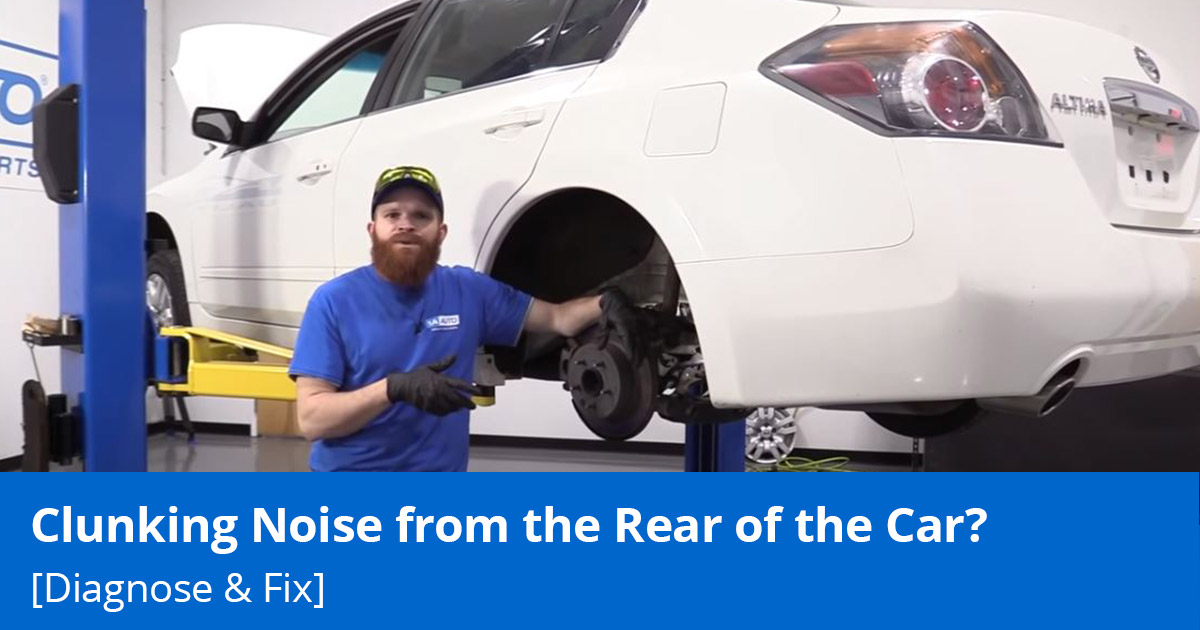
Credit: blog.1aauto.com
Identifying The Source Of The Noise
Identifying the source of a clunking noise from the rear of your car is crucial to address the issue effectively. By determining the exact origin of the sound, you can prevent any potential damage and ensure a safe driving experience.
Visual Inspection
Begin by visually inspecting the rear of your car. Look for any visible signs of damage, such as loose or broken parts, rust, or leaking fluids. Check the suspension components, such as the shocks, springs, and sway bars, as well as the exhaust system. Inspecting the tires and wheels for any irregularities can also help in pinpointing the source of the clunking noise.
Road Test
Take your car for a road test to further diagnose the issue. Pay close attention to the specific driving conditions that trigger the clunking noise. Note whether the sound occurs when accelerating, decelerating, turning, or driving over bumps. Observing these patterns can provide valuable information about the source of the noise.
Using A Stethoscope
If the visual inspection and road test do not yield conclusive results, using a stethoscope can help locate the exact source of the clunking noise. Place the stethoscope probe on different components of the rear suspension, such as the control arms, bushings, and bearings, while listening for the sound. This method allows for a more targeted and accurate assessment of the issue.
Also Read: Why Won’T My Key Fob Unlock My Car
Suspension Components
A clunking noise coming from the rear of your car can be caused by various issues related to suspension components. These components play a crucial role in supporting the weight of the vehicle, absorbing shocks, and providing a smoother ride. Understanding the potential problems related to suspension components can help diagnose and address the underlying issue. Let’s delve into the key suspension components that could be the source of the clunking noise.
Control Arms
Control arms, also known as A-arms, are vital components of a vehicle’s suspension system. They connect the wheel assembly to the vehicle’s frame and facilitate the up-and-down movement of the wheels. Worn or damaged control arm bushings can lead to a clunking noise, especially during acceleration or when driving over bumps.
Sway Bar Links
Sway bar links, also called stabilizer bar links, play a significant role in minimizing body roll and improving stability during cornering. If the sway bar links are worn or damaged, they can produce a clunking noise when the vehicle traverses uneven roads or encounters sudden weight shifts.
Struts Or Shocks
Struts and shocks are essential components responsible for dampening the impact of road irregularities and controlling the vehicle’s suspension movement. When these components wear out, they can create a distinct clunking sound, especially when going over bumps or negotiating rough terrain.
Credit: www.reddit.com
See Also: Car Feels Bouncy When Driving
Bushings
Experience a clunking noise from the rear of your car? It could be due to worn bushings, which can result in loose or unstable suspension components. Get them checked and replaced to ensure a smooth and quiet ride.
Bushings in a car play a crucial role in absorbing shocks and reducing noise, ensuring a smooth driving experience.Function Of Bushings
Bushings act as cushions between metal parts, reducing friction and allowing for a proper range of motion.Common Signs Of Worn-out Bushings
1. Unusual clunking noise from the rear of the car. 2. Excessive vibration felt while driving. 3. Uneven tire wear due to misaligned suspension. 4. Reduced handling and stability on the road.Replacing Bushings
When replacing bushings, ensure to use high-quality parts to maintain the integrity of your suspension system.Exhaust Components
Experience a clunking noise from the rear of your car? It could be a sign of exhaust component issues. Get them inspected and fixed to ensure a smooth and quiet ride.
Examining The Exhaust System
When it comes to diagnosing a clunking noise from the rear of your car, it’s important to pay attention to the exhaust components. The exhaust system plays a crucial role in reducing noise and controlling emissions. Examining the exhaust system is the first step in identifying the source of the clunking noise.To examine the exhaust system, start by visually inspecting the pipes, mufflers, and hangers. Look for any signs of damage, such as cracks or rust. Additionally, check if any parts are loose or hanging lower than usual. A loose or damaged exhaust component could be the cause of the clunking noise.Checking For Loose Or Damaged Parts
Once you have visually inspected the exhaust system, it’s time to check for loose or damaged parts. This can be done by gently shaking the exhaust pipes and mufflers. Pay close attention to any unusual movement or rattling sounds. If you encounter excessive movement or hear a clunking noise when shaking the exhaust components, it is likely that there is a loose or damaged part.In addition to shaking the exhaust components, you should also inspect the rubber hangers. These hangers are responsible for holding the exhaust system in place and minimizing vibrations. Look for any signs of wear, cracks, or deterioration. If the rubber hangers are damaged, they may need to be replaced to resolve the clunking noise issue.Repairing Or Replacing Exhaust Components
If you have identified loose or damaged exhaust components, it’s important to address the issue promptly. Ignoring the problem can lead to further damage or even complete failure of the exhaust system. Depending on the severity of the problem, repairing or replacing the exhaust components may be necessary.Repairing exhaust components can involve tightening loose parts or using clamps to secure them in place. However, if the damage is extensive, replacement may be the best option. When replacing exhaust components, it’s advisable to use high-quality aftermarket parts or original manufacturer equipment (OEM) to ensure proper fit and function.In conclusion, examining the exhaust system, checking for loose or damaged parts, and repairing or replacing exhaust components are crucial steps in addressing a clunking noise from the rear of your car. By paying attention to these areas, you can resolve the issue and get back to enjoying a smooth and quiet ride.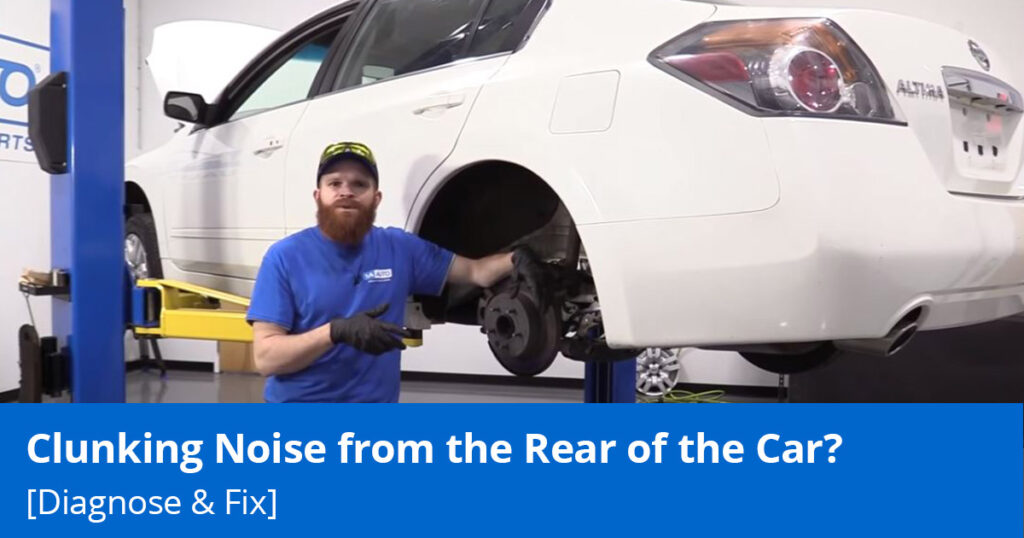
Credit: blog.1aauto.com
Other Possible Causes
When you hear a clunking noise coming from the rear of your car, it’s important to identify the cause as soon as possible. We’ve already discussed some potential causes, but there are a few more to consider. Let’s take a closer look at other possible factors that may be behind that irritating clunking sound.
Loose Lug Nuts
One of the most common culprits of a clunking noise from the rear of your car is loose lug nuts.
In simple terms, lug nuts are fasteners that secure your wheels to the vehicle’s hub. If they become loose, they can make a clunking noise as the wheels shift and move. Not only can this noise be annoying, but it can also pose a serious risk to your safety. Loose lug nuts can cause wheels to become unstable and potentially detach from the car while driving.
To check for loose lug nuts, use a jack to safely lift the rear of your car off the ground. Use a torque wrench or lug wrench to tighten each lug nut to the appropriate torque specification. Be sure to tighten them in a star pattern to ensure even distribution of torque.
Brake Issues
Another possible cause of a clunking noise from the rear of your car is related to your brakes.
If your brake pads are worn out or if there is an issue with the brake caliper, it can lead to abnormal movements and vibrations in the braking system. This can result in a clunking noise, especially when you apply the brakes.
If you suspect that brake issues are causing the noise, it’s crucial to have your brakes inspected by a qualified mechanic. They will be able to determine if the brake pads need to be replaced or if there are any other issues that need to be addressed.
Driveshaft Problems
A less common but still potential cause of clunking noises from the rear of your car is problems with the driveshaft.
The driveshaft is responsible for transferring power from the transmission to the rear wheels. If there is excessive wear or damage to the driveshaft or its components, it can lead to clunking noises. This is often accompanied by vibrations and a noticeable decrease in performance.
If you suspect driveshaft problems, it’s important to have your vehicle inspected by a professional technician. They will be able to diagnose the issue and determine if repairs or replacement are necessary.
Remember, addressing the cause of a clunking noise from the rear of your car is essential for your safety and the longevity of your vehicle. Whether it’s loose lug nuts, brake issues, or driveshaft problems, seeking the assistance of a qualified mechanic will ensure that the issue is resolved properly.
Diy Troubleshooting And Fixes
When hearing a clunking noise from the rear of your car, diving into DIY troubleshooting and fixes can save you time and money. Below are some simple methods to address this issue.
Checking And Tightening Bolts And Nuts
Inspect all bolts and nuts in the rear area of your car for any looseness. Use appropriate tools to tighten them securely.
Lubricating Suspension Components
Apply lubricant to the suspension components to reduce friction and eliminate the clunking noise.
Replacing Worn-out Parts
If tightening and lubricating don’t solve the issue, consider replacing any worn-out or damaged parts that could be causing the noise.
When To Seek Professional Help
If you notice a clunking noise coming from the rear of your car, it's important to address it promptly to avoid potential safety hazards and costly repairs. While some DIY enthusiasts may attempt to diagnose and fix the issue themselves, certain problems require the expertise of a professional mechanic.
Complex Suspension Repairs
Issues related to the suspension system, such as worn-out bushings or damaged shocks, should be handled by a skilled technician. Attempting to address these complex repairs without the necessary equipment and expertise can lead to further damage and compromised driving safety.
Exhaust System Replacements
If the clunking noise is originating from the exhaust system, it’s crucial to seek professional help to assess and address the issue. This may involve replacing damaged mufflers, catalytic converters, or exhaust pipes, which requires specialized knowledge and tools.
Safety Concerns
Driving with unresolved rear-end clunking noises poses safety risks, including potential loss of vehicle control and compromised braking ability. Seeking professional help promptly can help ensure your vehicle’s safety systems are functioning optimally, minimizing the risk of accidents and potential injuries.
Conclusion
If you’re experiencing a clunking noise from the rear of your car, addressing it promptly is crucial. Ignoring such issues can lead to bigger problems down the road. Consult a professional mechanic to diagnose and fix the root cause for a smoother and safer driving experience.
Your car’s health matters!







